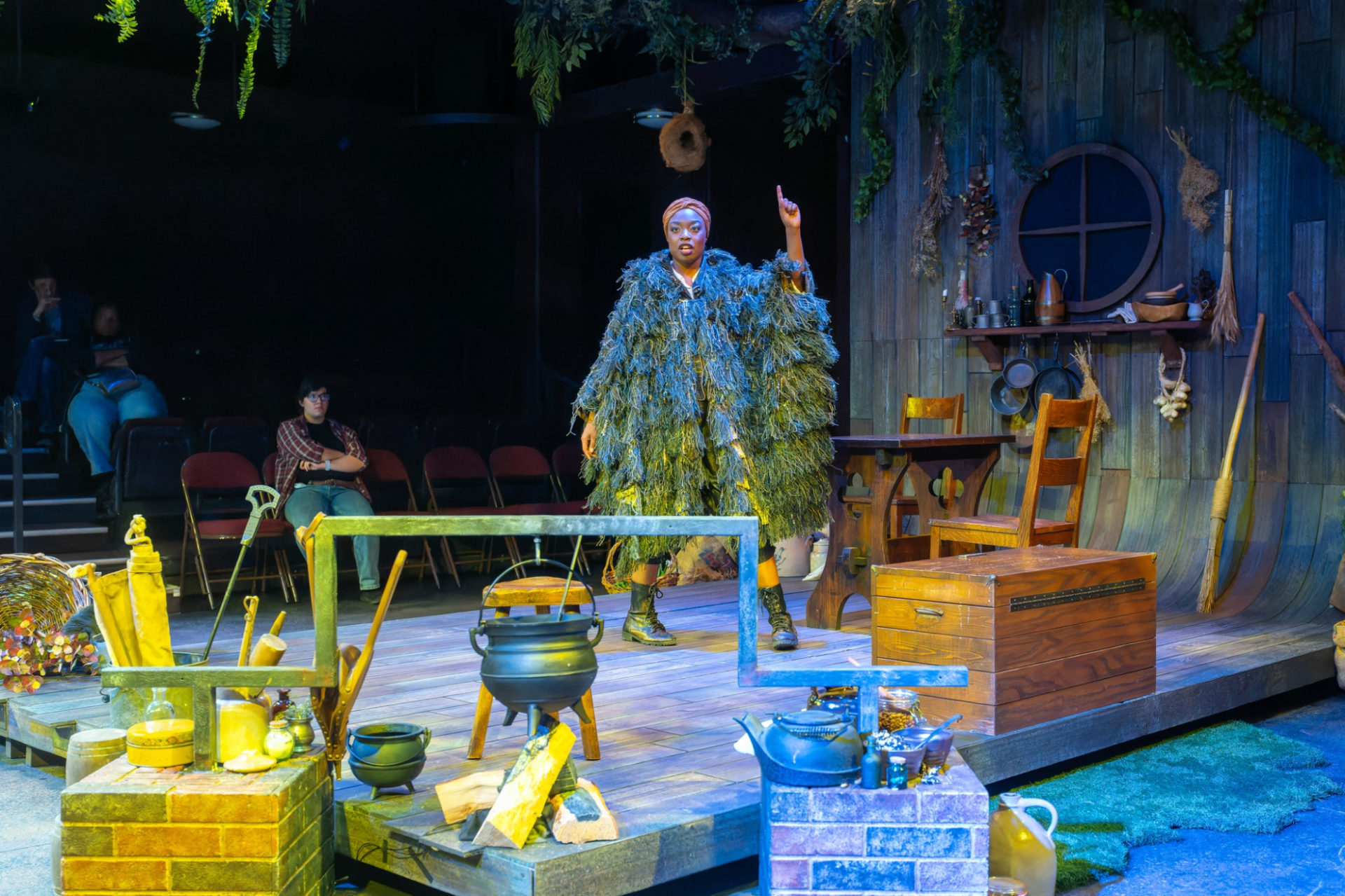When it comes to stories, it’s been said that there are ultimately two kinds of stories to tell: a.) someone sets off on a journey, and b.) a stranger comes to town. This past weekend, at Krannert Center for the Performing Arts, I attended a production of the play Witch, written by Jen Silverman, a retelling of The Witch of Edmonton, dating back to Early Modern England. Silverman retains the setting of 17th century England, but the dialogue pinpoints contemporary anxieties about class, gender, capitalism, and revolution. The play opens with the arrival of a stranger in Edmonton — the devil — ready to grant your wildest dreams in exchange for very little, just your soul.
This play’s devil, who goes by Scratch, begins by making seemingly competing offers to Cuddy, the privileged son of the landowner Sir Arthur, and Frank, Sir Arthur’s protégé. Cuddy’s entitlement and Frank’s limitless ambition make it easy for Scratch’s offers to sound enticing. But when the devil turns to the town’s supposed witch, Elizabeth, he’s met with an enigma. Ostracized by the rest of Edmonton and deeply aware of the need for a change in the status quo, Elizabeth at first seems like a natural target. But she resists the devil’s lure, not only demanding his respect, but demanding that he match her powers of imagination for a better and more equitable world.
Whenever the devil gets involved in a story, my interest is immediately piqued. So I jumped at the chance to see this play, an Illinois Theatre production helmed by University of Illinois students in the BFA and MFA theatre programs. The student performers were exceptionally passionate, and their performances ricocheted off the stage at the Studio Theatre. Jaylon Muchison as Scratch and Ernest Emmanuel Peeples as Sir Arthur, in particular, brought the full force of their charisma and presence to the stage. However, it was Y’vonne Rose Smith as Elizabeth who stood out the most. Smith brought a passion and gravitas to this character that made it easy for me to believe that the devil would be fascinated by her. Elizabeth is a character who fiercely remains true to herself, who says to Scratch that her soul is all she has when the world tries to tear her apart. Via Smith’s performance, I found myself not only succumbing to Elizabeth’s complexities alongside Scratch, but also fully believing that she could change the world single-handedly.
Aside from the performances and Elizabeth’s character, however, I found the play somewhat unsatisfying. While the calls for revolution and change were real and compelling, the pacing felt jagged and rather off. The first act seemed to go on for much too long, and the second act felt disjointed and fragmented. As a viewer, I don’t expect all the play’s questions to be resolved, yet it seemed that the characters — namely, Cuddy and Sir Arthur — never really grappled with their actions. For example, Cuddy nervously practices his dancing alongside Frank’s corpse, yet instead of giving us insight into his emotional state, or showing us an interaction between father and son, we’re treated instead to Cuddy’s own personal dance routine, complete with electronica and flashing lights. This omission was interesting, given the overarching theme of power and capital and how the two interact in these characters’ lives.
In addition to arriving in Edmonton as a stranger, Scratch also goes on a journey of sorts. In meeting Elizabeth and her resistance to his promises and offers, his perspective changes. While he arrives to town wielding the power of innermost desires and ready to manipulate those desires for his own needs, he’s left wondering what his purpose is. Spending time with the town’s “witch” allows him to feel, to love, and to think beyond himself. With all Elizabeth’s talk of revolution, and her insistence that in order to reimagine the world it must first be laid waste, it’s her hidden, hopeful, vision that takes hold of Scratch, her staunch and unbending willingness to give in to his wiles.
The play’s cold open with Elizabeth and her intense soliloquy and call for revolution gives us in the audience a glimpse of the passion that this character harnesses and opens the door to what could be if we’re willing to destroy something first. Scratch’s promises are in a similar vein, but the destruction involves our own souls. Despite being scions of power, Cuddy and Frank are willing to risk their own souls for very little, turning to the devil to solve their petty squabbles, and ultimately doing the work themselves to fulfill Scratch’s promises. Their shallowness is juxtaposed with Elizabeth’s much more profound insights on power, society, sacrifice, and imagination. Ultimately, the tensions between Cuddy, Frank, and Sir Arthur illustrate the banality of both the very rich and those who desire what they have.
Elizabeth asks us, and herself, “What if there was something amazing ahead and all we had to do was burn down everything we knew to get to it? Would we?” As we in the audience left the play, we came upon blank pieces of paper and a pin board, and we were invited to answer the question, “What would you burn down to start over?” Answers ranged from silly to sincere. By posing this question and allowing us to share our answers, the production invites us to reimagine the world as something more than it is. Can we rise to the challenge, or will be succumb to the banality of the rich and powerful?
Witch
Krannert Center for the Performing Arts
500 S Goodwin Ave
Urbana
Feb 14th, 7:30 p.m.
Feb 15th +16th, 7:30 p.m. (waiting list only)
Feb 17th, 2 p.m. (waiting list only)
$10-$60








